Why duplicate medications are a silent danger for seniors
Imagine you’re 72 and seeing three specialists this month: a cardiologist for your high blood pressure, a rheumatologist for your arthritis, and a neurologist for your migraines. Each one writes you a new prescription. You leave each appointment thinking, "This will help." But what if two of those drugs do the exact same thing? What if taking both drops your blood pressure too low, or causes dizziness that makes you fall? This isn’t rare. It happens every day.
Therapeutic duplication - when two or more drugs from the same class are prescribed without anyone realizing - is one of the most common and dangerous medication errors for older adults. According to a 2015 study published in the Journal of the American Medical Informatics Association, pharmacists saw 20.4 duplicate medication alerts for every 100 prescriptions filled. That’s more than one every five prescriptions. And in over a third of those cases, the pharmacist had to take action because the duplication was real and risky.
Seniors are especially vulnerable. On average, people over 65 take five or more prescription drugs daily. Add in over-the-counter painkillers, vitamins, and herbal supplements, and it’s easy to lose track. When specialists focus only on their own area - heart, joints, brain - they often don’t see the full picture. Your primary care doctor might not know what the cardiologist prescribed. The pharmacist might not know what the neurologist added last week. And you? You’re just trying to stay healthy.
How duplication happens - and why your doctors don’t always catch it
Duplicate medications don’t appear because doctors are careless. They appear because the system is broken.
Most specialists work in different clinics, using different electronic health records. Even if your cardiologist and your GP both use the same hospital system, they might not have full access to each other’s notes. A cardiologist might see you have high blood pressure and prescribe metoprolol. Your primary care doctor already prescribed metoprolol six months ago. Neither one sees the other’s note. The system doesn’t automatically flag it unless it’s set up to compare all active prescriptions - and even then, many providers override the warning because they’re rushed.
A 2022 survey by the American Society of Health-System Pharmacists found that 68% of pharmacists see at least one duplicate medication error every week. And 42% of those errors happened because there was no communication between providers. That’s not a glitch. That’s the norm.
Even when systems do flag a duplication, they’re not perfect. Alerts often pop up during refills - when you’re picking up your monthly prescription - but pharmacists don’t always have time to call the doctor. So they just click “override” and move on. One patient in Bristol told me they ended up with two blood thinners prescribed by different doctors. One was for atrial fibrillation. The other was for a recent knee surgery. Neither doctor knew the other had prescribed an anticoagulant. The patient nearly bled internally before a pharmacist caught it during a routine refill.
Your medication list: your most powerful tool
The single most effective way to stop duplicate medications is to keep a living, updated list - and bring it to every appointment.
Don’t rely on memory. Don’t write it on a napkin. Use a real list. Include:
- Every prescription drug - name, dose, how often you take it
- Every over-the-counter medicine - ibuprofen, aspirin, antacids, sleep aids
- Every vitamin, mineral, or supplement - fish oil, magnesium, ginkgo, turmeric
- Any herbal remedy - St. John’s wort, garlic pills, echinacea
Write it clearly. Use a phone app, a printed sheet, or even a photo of your pill bottles. But make sure it’s current. Update it every time you start, stop, or change a medication.
Bring your list - and your pill bottles - to every doctor visit. Not just your GP. Every specialist. When you walk into the rheumatologist’s office, hand them your list before they even ask. Say: “Here’s everything I’m taking. Can you check if anything overlaps with what you’re planning to prescribe?”
This simple step cuts duplication risk by more than half. A study from Kaiser Permanente showed that when patients brought full medication lists to appointments and doctors documented the reason for each drug, duplicate prescriptions dropped by 37%.
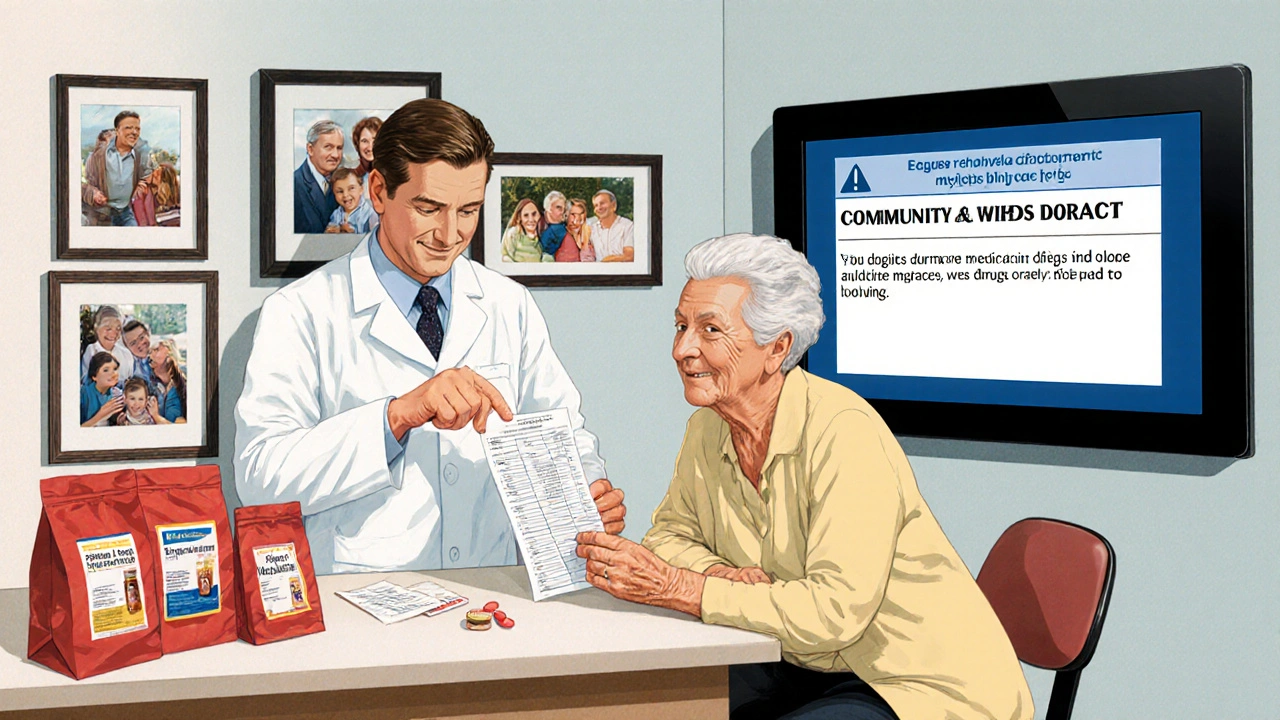
Use one pharmacy - it’s not optional
Going to different pharmacies for different prescriptions is like giving each doctor a different version of your medical history. If you get your blood pressure medicine from SuperPharm, your arthritis pills from Boots, and your painkillers from the corner chemist, no one has the full picture.
Pharmacists are trained to spot duplicates. They have software that flags when two drugs from the same class are prescribed. But that software only works if all your prescriptions come through one pharmacy. If you use multiple pharmacies, those alerts never show up.
Choose one pharmacy - any one - and stick with it. Tell your doctors: “I’m using [Pharmacy Name] for all my prescriptions.” Ask them to send all new scripts there. If a specialist insists on using their own pharmacy, ask them to fax or email the prescription to your main pharmacy so they can check for conflicts.
In Bristol, a 78-year-old woman had been getting metoprolol from her GP and carvedilol from her cardiologist - two beta-blockers that do the same thing. She didn’t realize they were similar. Her main pharmacy flagged it during a refill. They called her GP. Both drugs were stopped. One was replaced with a safer alternative. She went from dizzy and weak to steady and strong.
Ask the right questions - and don’t be shy
Doctors don’t always explain why you’re taking a drug. They assume you know. But you might not.
At every appointment, ask these three questions:
- “Why am I taking this?” - If you can’t explain the reason to yourself, you shouldn’t be taking it.
- “Is this new drug replacing something I’m already on?” - Sometimes, yes. But often, it’s added on top.
- “Can we check if this overlaps with anything else I’m taking?” - Say it like you’re asking for a second opinion. Because you are.
Also ask: “Is there a cheaper or safer alternative?” Sometimes, a drug you’ve been on for years can be swapped for something with fewer side effects - and less risk of duplication.
One man in his late 60s was taking both lisinopril and losartan - two different classes of blood pressure drugs. His cardiologist didn’t realize his GP had already started him on lisinopril. When he asked why he was on two, the cardiologist paused, checked his records, and said, “You’re right. We only need one.” He stopped the second one. His kidney function improved. His dizziness disappeared.
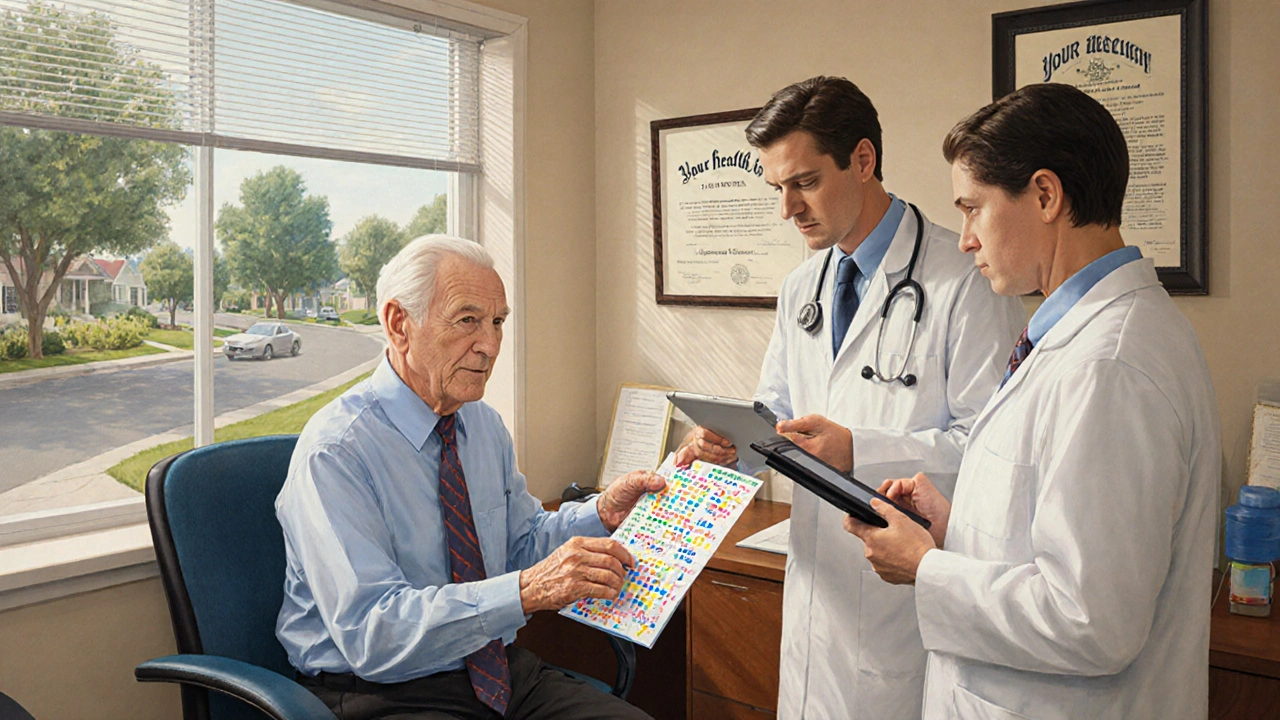
Get help from your pharmacist - they’re your safety net
Pharmacists are the last line of defense against duplicate medications. They see every prescription you pick up. They know what’s in your bottles. And they’re trained to spot red flags.
Don’t just pick up your meds and leave. Take five minutes to ask: “Can you review all my medications? I’m seeing multiple doctors. Is there anything here that might overlap or cause problems?”
Many pharmacies now offer free medication reviews - especially for seniors. In the UK, some community pharmacies even do home visits. Ask your pharmacist if they offer this service. If they don’t, ask your GP to refer you to one that does.
A 2023 study in U.S. Pharmacist found that when pharmacists did face-to-face reviews with seniors and then talked to their GP, emergency visits and hospital readmissions dropped by nearly 40%. That’s not just saving money. It’s saving lives.
What to do if you’ve already been prescribed a duplicate
If you realize you’re taking two drugs that do the same thing - don’t stop either one on your own. That can be dangerous.
Here’s what to do instead:
- Write down both drug names and what they’re for.
- Call your primary care doctor. Say: “I think I might be taking two drugs that do the same thing. Can we review them together?”
- Bring your full medication list to the appointment.
- Ask: “Which one should I keep? Why?”
- Once you decide, get the change in writing - and update your list.
If your doctor is unsure, ask for a referral to a pharmacist who specializes in geriatric medications. Many NHS practices now have pharmacists embedded in their teams - they’re there to help with exactly this.
The future is better - but you still need to act now
Technology is catching up. AI tools at places like Mayo Clinic are now spotting duplicate prescriptions with 143% more accuracy than before. Electronic records are slowly connecting. But none of that matters if you don’t take charge of your own care.
The truth is: no system is perfect. Not even the best hospital’s EHR. Not even the smartest AI. The only thing that works every time is you - with your list, your questions, and your willingness to speak up.
Don’t wait for someone else to fix this. Start today. Make your list. Pick your pharmacy. Ask your next doctor: “Is this new medicine replacing something, or adding to it?”
It’s not about being difficult. It’s about being safe.
What’s the most common cause of duplicate medications in seniors?
The most common cause is lack of communication between specialists and primary care doctors. Each provider treats one condition without seeing the full list of medications. For example, a cardiologist may prescribe metoprolol for high blood pressure, while the GP already prescribed the same drug. Neither knows the other did, and the patient doesn’t realize they’re taking two of the same kind of medicine.
Can over-the-counter drugs cause duplication?
Absolutely. Many OTC painkillers like ibuprofen and naproxen are NSAIDs - the same class as prescription versions. Taking both can lead to stomach bleeding or kidney damage. Even common supplements like fish oil or garlic pills can thin your blood - which becomes dangerous if you’re also on a prescription blood thinner like warfarin or apixaban. Always include OTCs and supplements on your medication list.
Should I stop a duplicate medication myself if I notice it?
No. Stopping a medication suddenly - especially for blood pressure, heart conditions, or mental health - can be dangerous. Always talk to your doctor first. They can help you safely stop one drug and switch to another if needed. Never adjust doses or stop drugs without professional advice.
How often should I update my medication list?
Update it every time you start, stop, or change a medication - even if it’s just a one-week course of antibiotics. Also review it every three months, even if nothing changed. Medication lists get outdated fast. Keep a printed copy in your wallet and a digital version on your phone.
Do all pharmacies in the UK share medication records?
Not fully. While the NHS Electronic Prescription Service links most prescriptions, not all pharmacies are connected to the same system - especially private or independent ones. Even if they are, they don’t always show what your GP or specialist prescribed unless you’ve used that pharmacy before. That’s why using one pharmacy consistently is so important - it gives them the full picture.

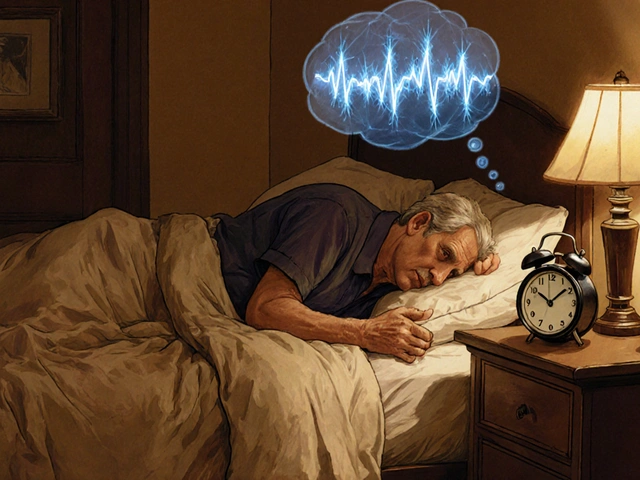
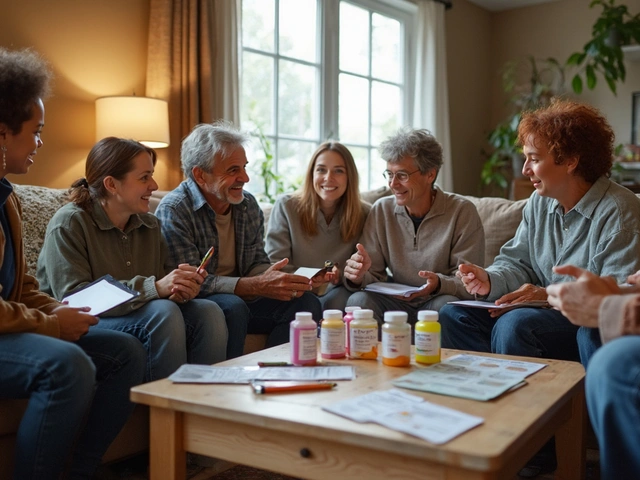
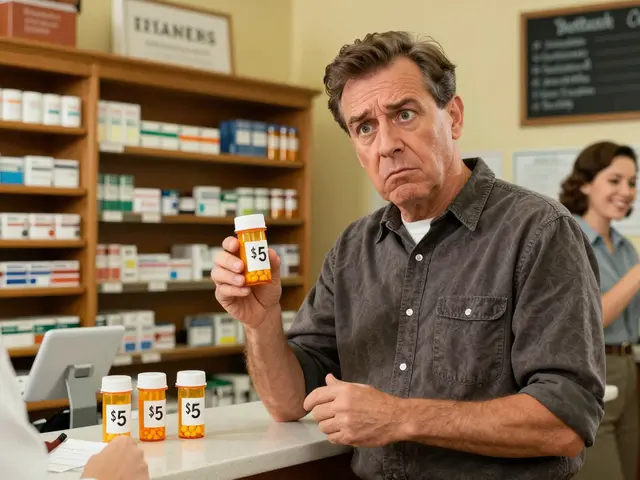
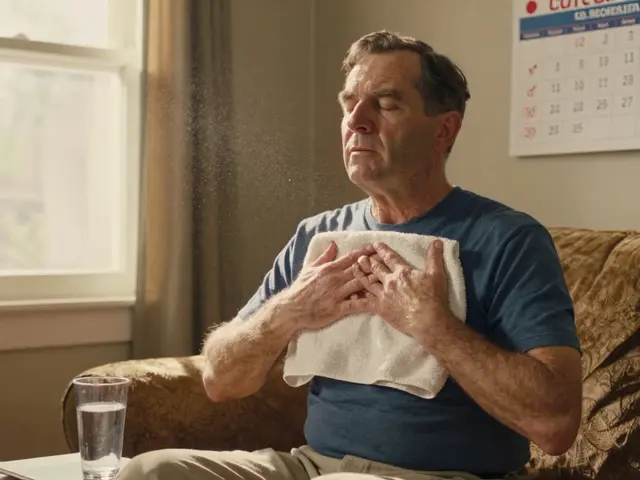
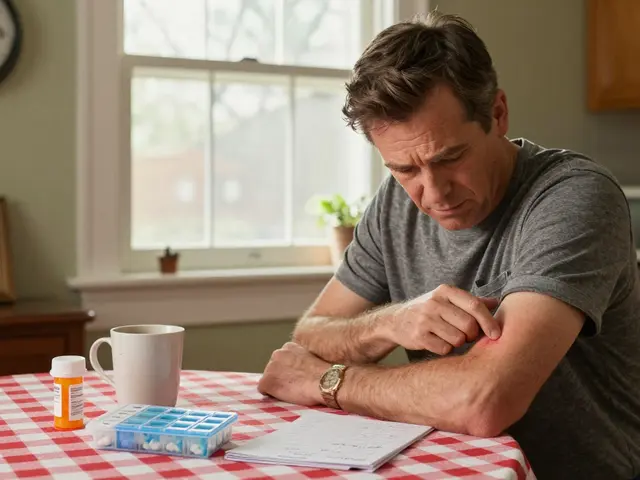
Comments
Conor McNamara
17/Nov/2025i dunno man... i think the gov and big pharma *want* us to take dupes. keeps us hooked. my uncle took 4 blood pressure pills and they all did the same thing. doc said "it's fine" but then he fell and broke his hip. coincidence? i think not.
Leilani O'Neill
17/Nov/2025This is precisely why Ireland’s NHS system is superior. In the UK, GPs coordinate everything through a unified digital record. Here in the States, it’s a carnival of incompetence. You’re not just at risk of duplication-you’re at risk of being treated like a data entry error.
Riohlo (Or Rio) Marie
17/Nov/2025The tragedy isn’t the duplication-it’s the *audacity* of the system that expects a 72-year-old to be their own pharmacist, case manager, and medical detective. We’ve outsourced empathy to algorithms and then blamed the patient for not navigating the labyrinth. It’s not negligence. It’s structural malice dressed in white coats.
steffi walsh
17/Nov/2025This is so important!! 💪 I just helped my mum update her med list last week-she had 3 different painkillers she didn’t even realize were the same class. She cried when she saw it. You’re not alone. Start today. You’ve got this.
Hal Nicholas
17/Nov/2025I’ve seen this. My neighbor’s wife took two SSRIs at once. No one caught it. She ended up in the psych ward. And now? The hospital won’t admit liability. They say she didn’t "disclose" properly. Bullshit. The system failed her. Again.
Louie Amour
17/Nov/2025Let’s be real-most seniors don’t have the cognitive capacity to manage this. You’re not just asking them to keep a list-you’re asking them to be a medical administrator. And if they can’t? They’re labeled "non-compliant." Meanwhile, the specialists keep prescribing like it’s a game of Jenga. The real problem isn’t the patient. It’s the arrogance of the system.
Kristina Williams
17/Nov/2025I work at Walmart pharmacy and I see this EVERY DAY. People come in with 12 different bottles from 5 different stores. I tell them to pick one pharmacy. They say "but my son gets his meds at CVS." I say "then your son’s meds are in a different universe." It’s wild.
Shilpi Tiwari
17/Nov/2025Therapeutic duplication is a classic pharmacokinetic failure in polypharmacy management. The absence of interoperable EHRs across provider silos creates suboptimal drug exposure profiles, particularly in geriatric populations with reduced CYP450 metabolism. The solution requires not just patient advocacy but also API-level integration of prescription data via HL7 FHIR standards-preferably with real-time CDS alerts embedded in the clinician workflow.